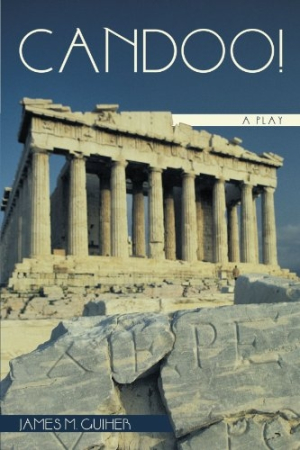Candoo!
A Play
Candoo! is James M. Guiher’s light, satirical play on the nature of success, power, and mortality. A.J. “Candoo” Jones is a rich Texas oil man who buys the Parthenon in Athens, Greece. Apparently, the idea that no one person should own priceless cultural history has ever crossed his mind. In Greece with Marbury, his lawyer, and Gloria, his spinster sister, A.J. sets up chairs, tents, and a portable toilet right there in the temple, with plans to let his wife redecorate.
A.J. is not a bad sort, but he fails to see the issues outside his own, solipsistic viewpoint. The leaders of other countries (Patagonia, Saudi Arabia, and Japan) he grapples with are depicted in fairly broad, borderline jingoistic terms, supposedly to reflect A.J.‘s quaint lack of cosmopolitan sensibilities: “PRIME MINISTER [of Japan]: We rike do business with your company.” It isn’t until A.J. crosses paths with the Greek god Zeus that he begins to grasp his own errors in judgment. Before he actually meets her father, Zeus’ daughter, Elena warns Candoo that hubris will only bring the wrath of the gods.
Guiher’s characterization is impressive, for the most part, with the exception of the previously noted world leaders. A.J., Gloria, and Marbury sound authentic and fresh. The dialogue is witty and sometimes revealing, without really exploring the realm of banter, which is not necessarily a drawback as humor needn’t always emerge from the quick retort. The plot seems credible, though we must be game enough to concede the outrageous premise: billionaire purchases Parthenon, receives visit from Zeus. Candoo! moves at a healthy pace. The play moves from one incident to the next incident rather quickly, which keeps things interesting.
Candoo! is very sound in the sense that the audience can surmise what’s happening on a cursory level. A.J. impinges on the domain of the gods, then realizes it’s not the path to fulfillment he’d imagined. Unfortunately, the character’s epiphany isn’t made clear on a visceral level.
Candoo! might best be described as a comedy fable. The title character’s nickname raises this question: Just because one can get away with something, doesn’t mean that one should. Americans tend to admire the “can-do!” spirit of those who refuse to concede, even when they are in the wrong.
Guiher certainly gets credit for originality and effective structure. A savvy, wealthy Texan is confronted by a god who no longer commands respect. They both have power, but neither one uses it well. A.J. forfeits his humanity for the sake of success, not realizing that humanity is the very quality the gods envy. The biggest flaw in Candoo! lies in its hero’s sea change. A.J. has a profound change of heart, but nothing he does sufficiently explains his transformation. That being said, the play is a clever, surprising, and amusing diversion.
Reviewed by
Christopher Soden
Disclosure: This article is not an endorsement, but a review. The publisher of this book provided free copies of the book and paid a small fee to have their book reviewed by a professional reviewer. Foreword Reviews and Clarion Reviews make no guarantee that the publisher will receive a positive review. Foreword Magazine, Inc. is disclosing this in accordance with the Federal Trade Commission’s 16 CFR, Part 255.

